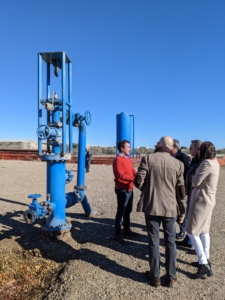Geothermal energy is a renewable energy source that harnesses the heat from the Earth’s interior to generate electricity. It is considered a clean and sustainable energy source because it does not produce greenhouse gas emissions or air pollution. Because of this, geothermal energy can play a significant role in helping to mitigate the effects of climate change.
One of the main benefits of geothermal energy is that it can provide a consistent and reliable source of power. Unlike solar and wind energy, which are dependent on weather conditions, geothermal power plants can operate 24/7.
Another benefit is that it has the potential to replace fossil fuels, which are the main source of greenhouse gas emissions. By replacing fossil fuels with geothermal energy, it can help to reduce emissions and slow down the pace of climate change.
Additionally, geothermal energy can also be used for other applications such as heating and cooling buildings, which can also help to reduce emissions.
In summary, geothermal energy is a clean and sustainable energy source that can help to reduce greenhouse gas emissions and mitigate the effects of climate change by providing a consistent and reliable source of power, replacing fossil fuels and supporting other applications such as heating and cooling buildings.

